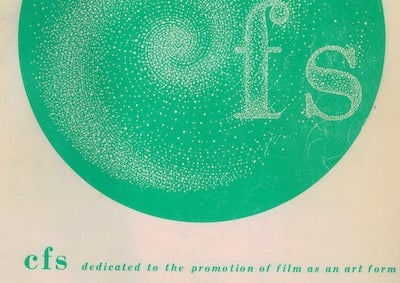The Creative Film Society (CFS) was formed in 1957 by Robert Pike primarily to distribute independent, experimental and animated short films, with an emphasis on filmmakers in the Southern California region. Pike's curatorial goal was the “consolidating the efforts of the individual West Coast film artists in terms of aiding closer communication of ideas, films and equipment, as well as distributing the finished works of the members.” CFS became an important distributer of the Los Angeles avant-garde film movement playing a significant part in avant-garde film community.
The CFS collection consists of approximately 825 individual film titles, primarily independent and experimental shorts by such film artists as: Arthur Lipsett, Rautis, Norman McLaren, Peter Foldes, Alan Septoff, David Perry, Kathy Strickland, Pat Sullivan, Paul Dopff, Baur, Dick Corben, Rene Jodoin, Patricia Marx, Charles Fischer, Scott Bartlett, Robert Swarthe and John Mayer, Dave Fleischer, James W. Horne, Frank Olvey and Robert Brown, Norman Gollin, Bill Norton and Steve Rosen, Venezia, Leonard Henny, Rick Friedberg, Mary Ellen Bute, James Glover, Ben Van Meter, Russell Kingston, Kevin Rafferty, Bruce Green, Peter Spoecker, Robert Swarthe and John Mayer, Len Lye, Paulmichel Mielche, Howard Lester, Walerian Borowczyk, Rob Thompson, Stuart Kusher, David Brain, Chuck Menville and Len Janson, Larry Secrist, Christopher McCulloch, Dick Harber, Ryan Larkin, Leonard Lipton, Paul von Shreiber, Robert Green, Bud Fisher, Jerry Fairbanks, Paul Golding, Tom Desimone, and Libby.
After Robert Pike's death in 1974, his widow, Angeline Pike, continued to operate Creative Film Society until 1999, when she stopped distributing films and donated the bulk of the CFS library to UCLA Film & Television Archive. In many cases, Mrs. Pike was able to donate two prints of each title, one for use and one for conservation. The bulk of the collection consists of 16mm safety prints with a small number of 35mm safety prints.
To view titles on the UCLA campus for research purposes, please contact the Archive Research and Study Center (ARSC).







